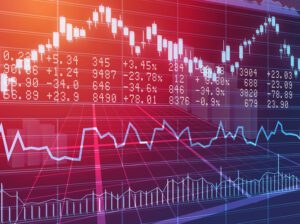
Quotes of futures for US stock indices change without any dynamics on Wednesday.
Investors fear that the US Federal Reserve’s determination to fight persistently high inflation will continue to push up borrowing costs, hurting the economy and corporate profits, MarketWatch writes.
“Our main view is that further tightening of US financial conditions is unlikely to stop until the economy either enters a clear recession or shows steady progress on inflation,” wrote Goldman Sachs analyst Dominic Wilson.
The yield on ten-year US government bonds rose above 4% per annum during trading on Wednesday, updating the maximum since April 2010, according to The Wall Street Journal. Moreover, the yield of US government bonds shows a record growth rate in four decades amid fears that the Fed is not going to abandon its policy of raising rates to combat the highest inflation in four decades.
Meanwhile, Hurricane Ian is approaching the US state of Florida, which has almost reached the fifth category on the scale of hurricane winds, the Associated Press reported on Wednesday.
According to the US Air Force, “Ian” rapidly gained strength in the Gulf of Mexico and at 7 am local time (14:00 KST) was 105 km from the coastal city of Naples, which is located in Florida.
The state’s losses from the effects of the hurricane could exceed $45 billion, Enki Research expert Chuck Watson predicted. Ian could be one of the eight worst hurricanes in US history, according to the National Oceanic and Atmospheric Administration.
Shares of Tyson Foods Inc. rise in price by 0.5%. The American food manufacturer made changes in the company’s management, including replacing the financial director.
Papers Lyft Inc. decrease by 1.1%. The American taxi ordering service will stop hiring new employees before the end of this year.
Share price of Apple Inc. decreases by 2.3%. The company is abandoning plans to increase production of new iPhone 14 models due to weak demand, Bloomberg writes, citing people familiar with the matter.
The value of the December futures E-mini on the Dow Jones index by 15:43 CSK increased by 0.37% and amounted to 29310 points. Quotation of the December E-mini futures on the S&P 500 rose by this time by 0.23%, to 3669.50 points. Futures on the Nasdaq 100 index for December lost 0.13% and reached 11,319 points.
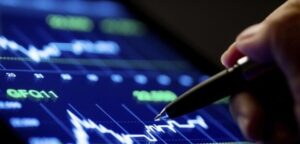
Equity markets in Western Europe fell sharply during trading on Wednesday, following the dynamics of the main stock indexes in the Asia-Pacific region.
The composite index of the largest companies in the Stoxx Europe 600 region fell by 1.69% by 12:30 pm to 381.66 points.
The British stock index FTSE 100 is down 1.57%, the German DAX – 1.6%, the French CAC 40 – 1.24%. Italian FTSE MIB loses 1.56%, Spanish IBEX 35 – 1.78%.
Asian stocks also fell heavily, with Hong Kong’s Hang Seng hitting a 13-year low.
Investors are still worried about forecasts of a global economic recession amid persistently high inflation and aggressive measures by the largest central banks to contain it.
The European Central Bank (ECB) will raise interest rates at the next few meetings, the head of the regulator, Christine Lagarde, said at an event in Frankfurt on Wednesday.
“We will do what we must, which is to keep raising interest rates at the next meetings,” Lagarde said. “Our main goal is price stability, and we must achieve it. If we do not achieve, then the economy will suffer even more.”
In early September, the ECB raised all three key interest rates by 75 basis points (bp) for the second time in a row. The base interest rate on loans was raised to 1.25% per annum, the rate on deposits – up to 0.75%, the rate on margin loans – up to 1.5%. Markets expect the European Central Bank to raise rates by another 75 bp in October.
Meanwhile, the leading indicator of consumer confidence in Germany, calculated by the research company GfK, updated a historical low in October. The value of the indicator fell to minus 42.5 points compared to minus 36.8 points in September. A record low is recorded following the results of the fourth month in a row.
Analysts on average predicted a less significant drop – to minus 39 points, according to Trading Economics.
The consumer confidence index in France in September fell to 79 points compared to 82 points a month earlier, data from the national statistical office Insee showed. As a result, its value coincided with the historical minimum, which was recorded in May 2013 and in July this year.
Experts on average expected a reduction of only 80 points.
German industrial group Thyssenkrupp AG plunged 12.1% to become one of the top three Stoxx 600 stocks. JPMorgan analysts affirmed the company’s underweight rating.
The shares of Norwegian fish companies SalMar ASA (-27.5%) and Mowi ASA (-19.2%) also fell most significantly.
Dutch supermarket operator Royal Ahold Delhaize NV is down 0.6%. The company’s Board of Directors intends to propose to shareholders that they reappoint CEO and Chairman of the Board Frans Müller for another term.
The capitalization of the British fashion house Burberry Group Plc is growing by 3.4%. The company’s chief creative officer, Riccardo Tisci, will retire at the end of September. He will be replaced by Daniel Lee.
Asia-Pacific region, DYNAMICS, European stock markets, Stock indices
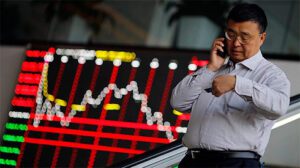
Stock indices of the largest states of the Asia-Pacific region show a significant decline on Wednesday, while the value of the Hong Kong Hang Seng fell to its lowest level in more than 13 years.
Investors fear that aggressive measures by the Federal Reserve System aimed at curbing inflation could push the US economy into recession, according to Trading Economics. The American Standard & Poor’s 500 index dropped to a low of this year a day earlier.
The value of the Japanese index Nikkei 225 to 8:32 quarter decreased by 2%.
Nippon Sheet Glass Co., a glass manufacturer, was the drop leader. (-6.3%), automotive Mitsubishi Motors Corp. (-5.9%), transport Kawasaki Kisen Kaisha Ltd. (-5.4%).
In addition, the price of securities of investment and technology SoftBank Group (-2.8%), console manufacturer Nintendo (-2.3%), retailers J. Front Retailing Co. is declining. (-4.7%) and Fast Retailing Co. (-4.6%).
The leading economic index in Japan in July fell to a 2.5-year low (since January 2021) and amounted to 98.9 points compared to 100.3 points in the previous month.
The Chinese Shanghai Composite index fell by 1.3% by 08:37 Moscow time. The Hong Kong Hang Seng lost 2.7%, while the shares of all companies included in the calculation of the indicator show a decrease in value.
Among the leaders in the reduction of quotations on the Hong Kong Stock Exchange are securities of real estate developers Country Garden Holdings Co. (-11.1%) and Longfor Group Holdings Ltd. (-5.4%), automaker Geely (-6.1%),
solar panel manufacturer Xinyi Solar Holdings Ltd. (-5.7%).
Shares of Internet retailers Alibaba Group fell 2.2% and JD.com – 4.5%, Internet giant Tencent Holdings Ltd. – by 1.2%.
The South Korean index Kospi by 08:33 Moscow time fell by 2.8%.
Quotes of securities of one of the world’s largest manufacturers of chips and consumer electronics Samsung Electronics Co. dropped by 2.4%, automaker Hyundai Motor – by 4.3%.
KR Motors Co., a motorcycle and auto parts maker, was the leader of the increase, with prices soaring 30%.
The Australian S&P/ASX 200 has dropped 0.8% since the market opened.
Shares of the world’s largest mining company BHP traded at the close of the previous session, while the price of securities of another representative of the industry Rio Tinto decreased by 0.6%.
The capitalization of the oil company Santos fell by 1.7%.
Retail sales in Australia in August, according to preliminary data, rose by 0.6% compared to the previous month and reached a record 34.88 billion Australian dollars ($22.3 billion). The increase was noted for the eighth month in a row.
Analysts had expected an average less significant rise of 0.4%.
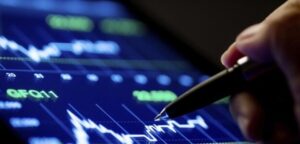
Stock indices of Western European countries do not show a single dynamics during trading on Monday.
The composite index of the largest companies in the region Stoxx Europe 600 by 11:27 Moscow time fell by 0.11% and amounted to 389.98 points.
The British stock index FTSE 100 rose by 0.06%, while the German DAX by 0.26%, the French CAC 40 – by 0.33%. The Italian FTSE MIB was up 1.26%, while the Spanish IBEX 35 was down 0.35%.
Concerns about the state of the global economy are intensifying against the backdrop of persistently high inflation and aggressive measures by the largest central banks to contain it, writes CNBC.
The focus is on the elections in Italy.
The Democratic Party of Italy admitted defeat in early parliamentary elections held on Sunday, media reported.
After the announcement of the official results of processing 10% of the ballots in the elections, a coalition of four right-wing parties is in the lead with 44% of the vote. The best results for the party “Brothers of Italy”. This means that its leader, George Meloni, in the event that the center-right comes to power, may become the new Italian prime minister.
Democratic Vice Chair Deborah Serracchiani conceded defeat and said the Democrats were moving into opposition.
The pressure on the market is also exerted by the ongoing geopolitical tensions in connection with the ongoing referendums in a number of regions of Ukraine on joining Russia.
Meanwhile, the level of business confidence in the German economy in September fell to 84.3 points from 88.6 points in August, according to a report by the IFO research organization. The indicator is at a minimum since May 2020 and turned out to be worse than analysts’ forecast at the level of 87 points, writes Trading Economics.
Shares of the British financial company Virgin Money UK PLC are among the leaders of the fall among the components of the Stoxx Europe 600 index, losing 6.7%.
Meanwhile, the papers of the German Uniper SE, which add 23.2%, turned out to be the growth leaders.
Shares of the Swiss HVAC maker rose 8.4% as Berenberg experts improved the company’s stock recommendation and raised its price target.
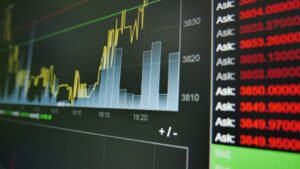
Stock indices of the largest countries in the Asia-Pacific region fall on Thursday following the US stock market.
Trading on stock exchanges in Australia on Thursday is not held in connection with the Day of Sorrow for Queen Elizabeth II.
Investors evaluate the results of the September meeting of the US Federal Reserve System (FRS). The American Central Bank raised the interest rate on federal funds (federal funds rate) by 75 basis points, now its range is 3-3.25% per annum. The decision coincided with the forecasts of most economists and analysts and was adopted unanimously by all 12 voting members of the FOMC.
Thus, the Fed raised the base rate by 75 bp. for the third meeting in a row. It is now at its highest level since the 2008 financial crisis. At the same time, based on Fed estimates, by the end of 2022 the rate will reach 4.4% per annum.
The Fed, along with many other central banks around the world, has been actively raising interest rates this year in order to slow down economic growth and curb inflation, beating multi-year records. Financial market participants, in turn, are worried that such actions could harm the growth of the global economy and provoke a recession.
Meanwhile, the Bank of Japan continues to stay away from the global wave of tightening monetary policy, despite increased inflation in the country. The regulator left unchanged the main parameters of monetary policy (MP) on the basis of the two-day meeting that ended on Thursday.
The short-term interest rate on deposits of commercial banks with the Central Bank was left at minus 0.1% per annum, the target yield on ten-year government bonds is near zero, the Japanese Central Bank said in a statement. The Bank of Japan also confirmed that it intends to keep the rate “at the current level or below.”
The value of the Japanese index Nikkei 225 by 8:15 Moscow time decreased by 0.6%.
The drop leader is shares of non-ferrous metal producer Toho Zinc Co. Ltd. (-2.95%), logistics Kawasaki Kisen Kaisha Ltd. (-2.7%) and recruiting Recruit Holdings Co. Ltd. (-2%).
Papers of the software developer Oracle Corp. (SPB: ORCL) Japan fell 5% after the release of its first financial quarter. The company’s net profit decreased by 3.8% on the back of rising costs.
The Chinese Shanghai Composite index fell by 0.2% by 8:20 Moscow time, the Hong Kong Hang Seng lost 1.8%.
Leading decliners on the Hong Kong Stock Exchange include shares of PC maker Lenovo Group Ltd. (-4.8%), IT company Alibaba Group Holding (SPB: BABA) Ltd. (-3.2%), operator of the Hong Kong exchange Hong Kong Exchanges & Clearing Ltd. (-3%) and JD.com Inc. (SPB: JD) (-2.9%).
The South Korean index Kospi by 8:25 Moscow time fell by 1%.
Shares of one of the world’s largest manufacturers of chips and consumer electronics Samsung Electronics Co. fell by 1.6%, automaker Hyundai Motor – by 1.8%.
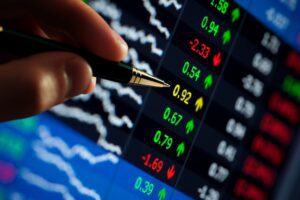
Stock indices of the largest states of the Asia-Pacific region on Wednesday showed a decrease following the similar dynamics of the US stock market a day earlier.
Traders’ attention is focused on the meetings of the Central Bank of several large countries at once, which will be held this week. The results of the meeting of the leadership of the US Federal Reserve System will be especially important.
Most experts believe that the US Central Bank will raise the base interest rate by 75 basis points (bp) following the meeting, which will end on September 21. However, some analysts consider a 100 bp increase possible at once. In addition, financial market participants will evaluate the forecasts of the Fed regarding the future level of the rate and the economy.
In addition, geopolitical tensions in the world and the expected slowdown in global economic growth have a negative impact on investor sentiment.
The Asian Development Bank (ADB) downgraded its economic growth forecast for emerging Asia for 2022-2023 on Wednesday. amid rising global risks. Now GDP is expected to increase by 4.3% this year compared to 5.2% expected in April, next year – by 4.9% against 5.3% earlier.
“Emerging Asia continues to recover, but the risks are high,” said ADB chief economist Albert Park. to financial instability.
He also noted that the Chinese economy is facing problems due to repeated lockdowns and a weak real estate sector. The estimate of China’s GDP growth for this year was downgraded by ADB analysts to 3.3% from 5% forecast in April.
China’s Shanghai Composite index closed down 0.2%, while Hong Kong’s Hang Seng lost 1.8%. Both indicators are at their four-month lows.
Shares of solar panel maker Xinyi Solar Holdings Ltd were among the top decliners on the Hong Kong Stock Exchange. (-8%), which produces semiconductors Sunny Optical Technology Group Co. (-10.5%), automakers Geely (-4.6%) and BYD (-2.2%), game developer Netease Inc. (SPB: NTES) (-3.6%), online retailers Alibaba (SPB: BABA) (-3.7%) and JD.com (-2.9%).
The value of the Japanese Nikkei 225 index for the day decreased by 1.4%.
Shares of polymer producer Unitika led the fall, losing 7.5%. The price of securities of the investment and technology SoftBank Group (-1.2%), the manufacturer of prefixes Nintendo (-1.2%), automotive Toyota Motor (-2.4%) and Nissan Motor (-3.1%) also decreased.
Shikoku Electric Power’s share price fell 5.2% after the power company announced it would not pay dividends for the first half of the year due to uncertainty about future fuel prices.
South Korea’s Kospi fell 0.9% on Wednesday.
Shares of one of the world’s largest manufacturers of chips and consumer electronics Samsung Electronics Co. fell by 0.9%, automaker Hyundai Motor – by 0.8%.
Auto parts makers Hwacheon Machinery Co. led the pack, up nearly 30% after falling by a similar amount in previous trading.
The Australian S&P/ASX 200 lost 1.6%.
The market value of the world’s largest mining companies BHP and Rio Tinto decreased by 3.1% and 3.7%, respectively. Iron ore prices fell to a nine-month low due to an expected contraction in steel demand.
Oil companies Woodside Energy and Santos lost 1.9% and 1%.